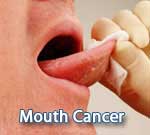Throat Cancer
Followup Care:
NutritionSome people who have had treatment for cancer of the larynx may lose their interest in food. Soreness and changes in smell and taste may make eating difficult. Yet good nutrition is important. Eating well means getting enough calories and protein to prevent weight loss, regain strength, and rebuild healthy tissues.
If eating is difficult because your mouth is dry from radiation therapy, you may want to try soft, bland foods moistened with sauces or gravies. Thick soups, puddings, and milkshakes often are easier to swallow. The nurse and the dietitian will help you choose the right foods.
After surgery or radiation therapy, some people need feeding tubes placed into the abdomen. Most people slowly return to a regular diet. Learning to swallow again may take some practice with the help of a nurse or speech pathologist. Some people find liquids easier to swallow; others do better with solid foods. You will find what works best for you.
Followup care is important after treatment for cancer of the larynx. Regular checkups ensure that any changes in health are noted. Problems can be found and treated as soon as possible. The doctor will check closely to be sure that the cancer has not returned. Checkups include exams of the stoma, neck, and throat. From time to time, the doctor may do a complete physical exam and take x-rays. If you had radiation therapy or a partial laryngectomy, the doctor will also examine you with a laryngoscope.
Treatments for laryngeal cancer can affect the thyroid. A blood test can tell if the thyroid is making enough thyroid hormone. If the level is low, you may need to take thyroid hormone pills.
People who have laryngeal cancer have a chance of developing a new cancer in the mouth, throat, or other areas of the head and neck. This is especially true for those who are smokers or drink alcohol heavily. Most doctors strongly urge their patients to stop smoking and drinking to cut down the risk of a new cancer and other health problems.





































